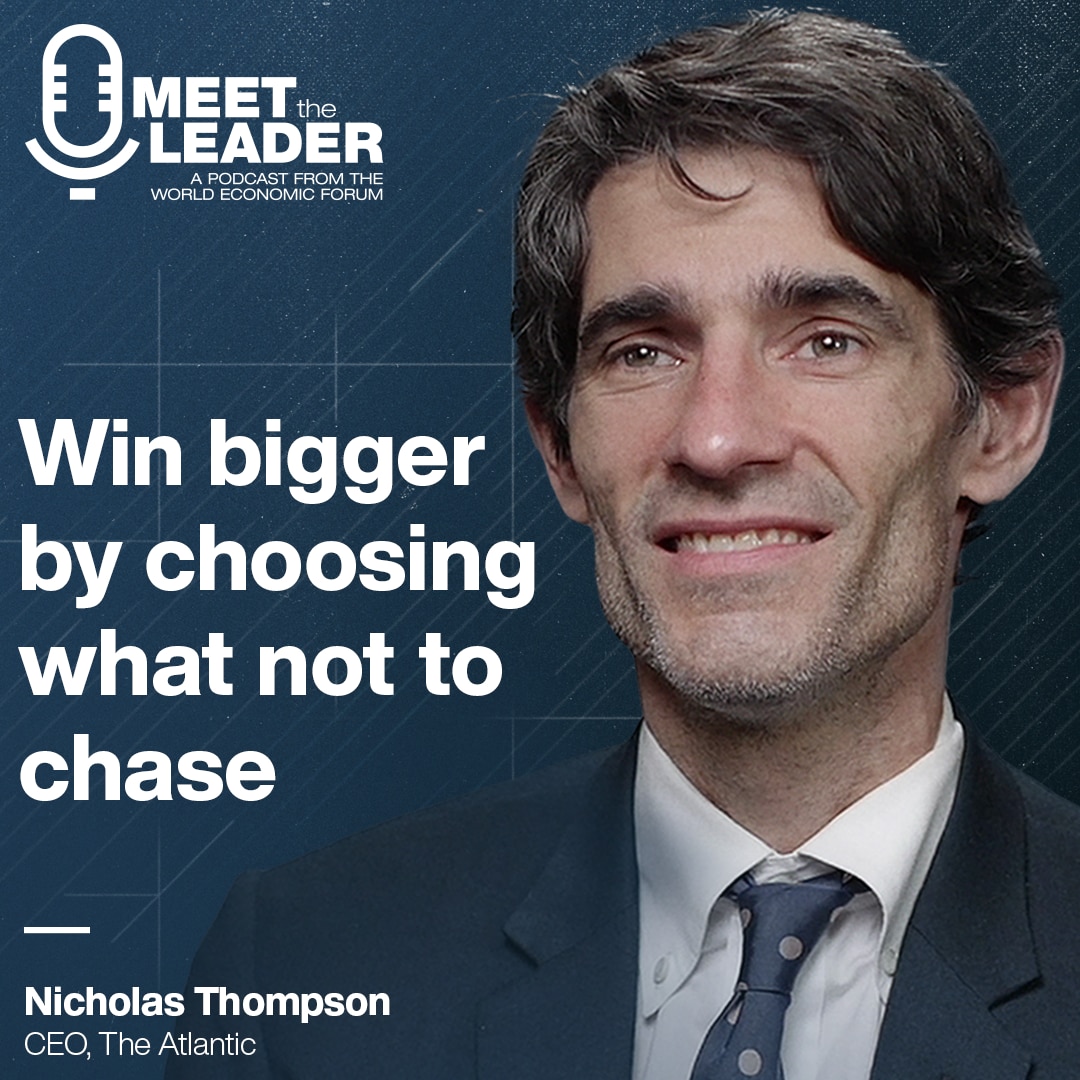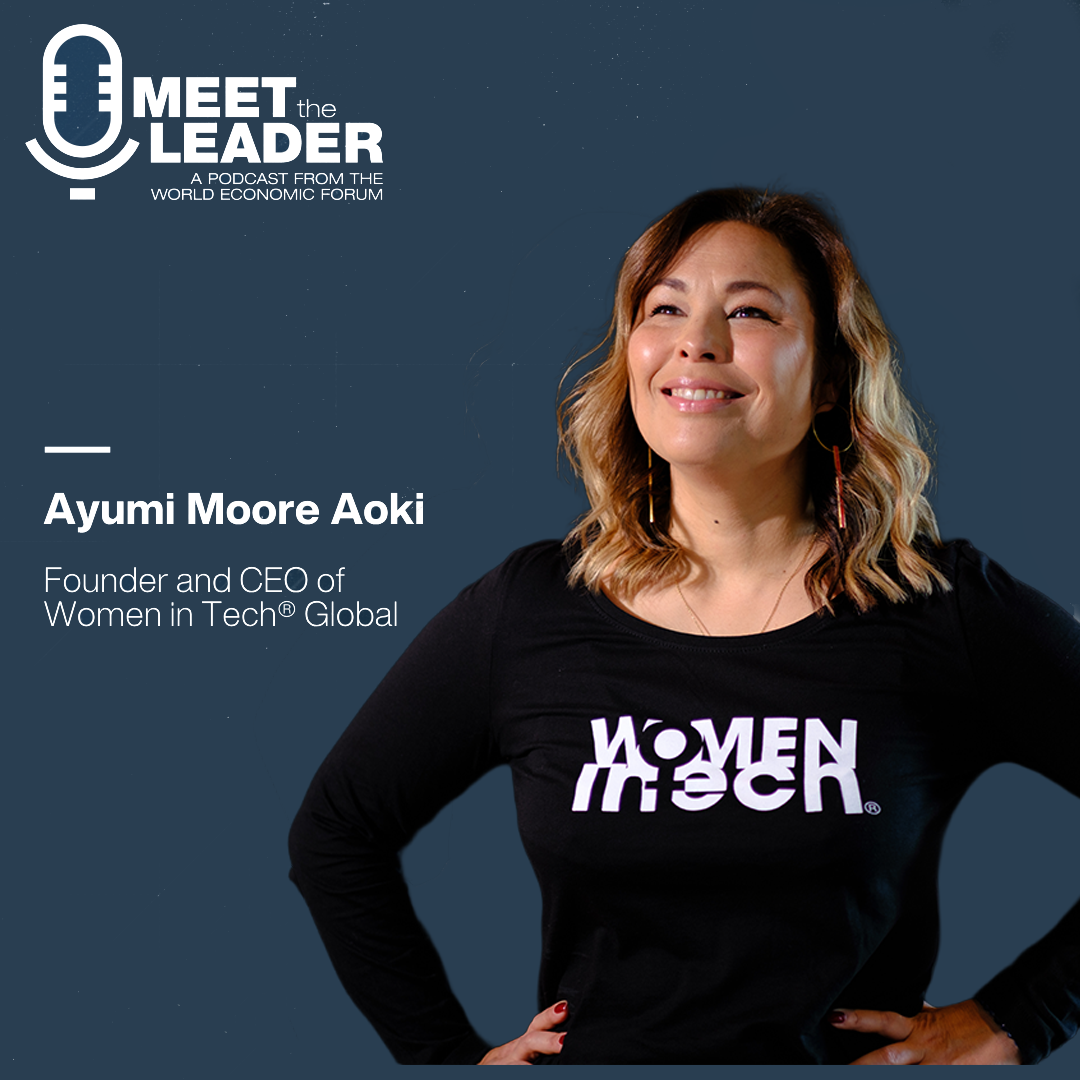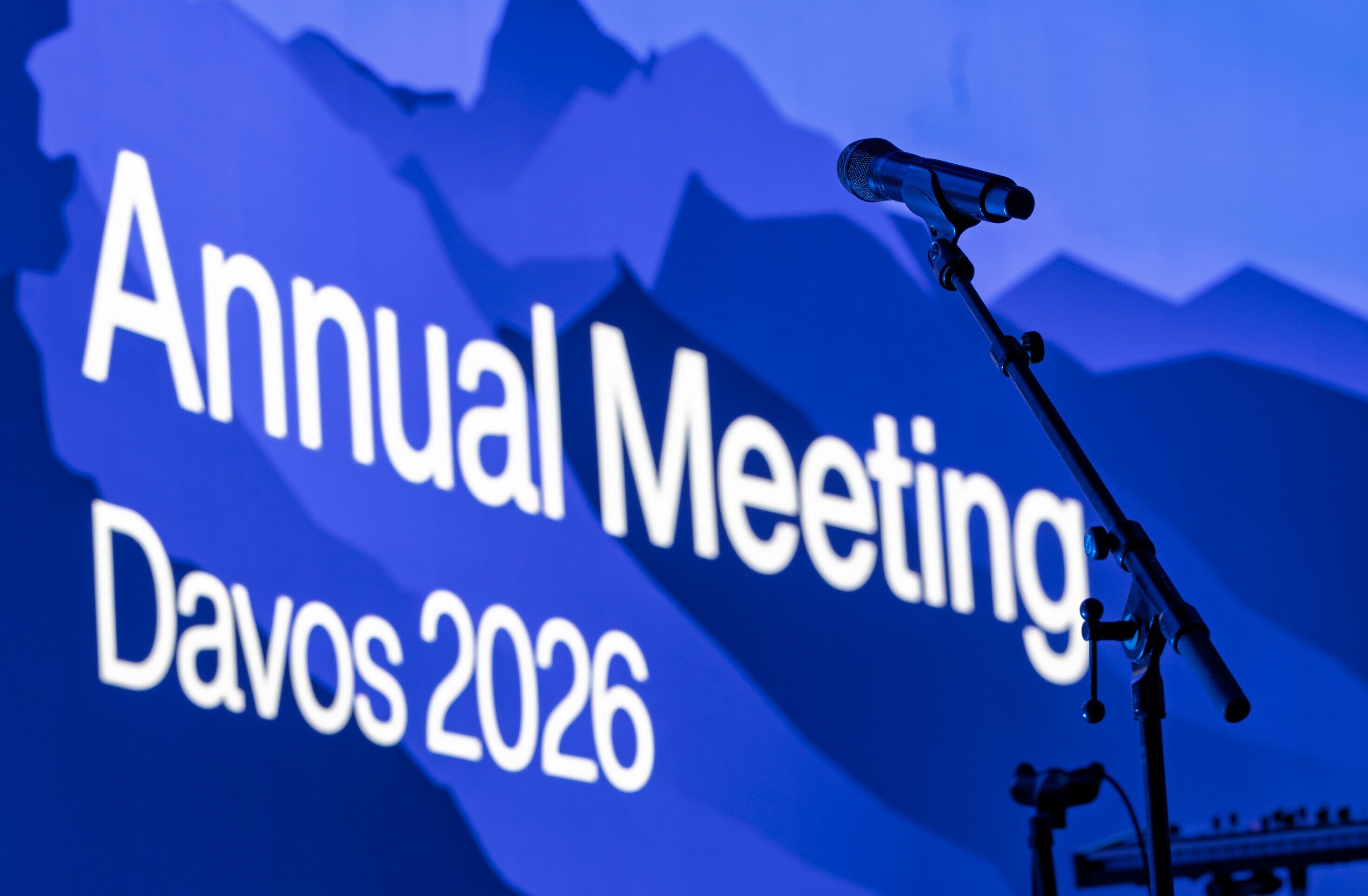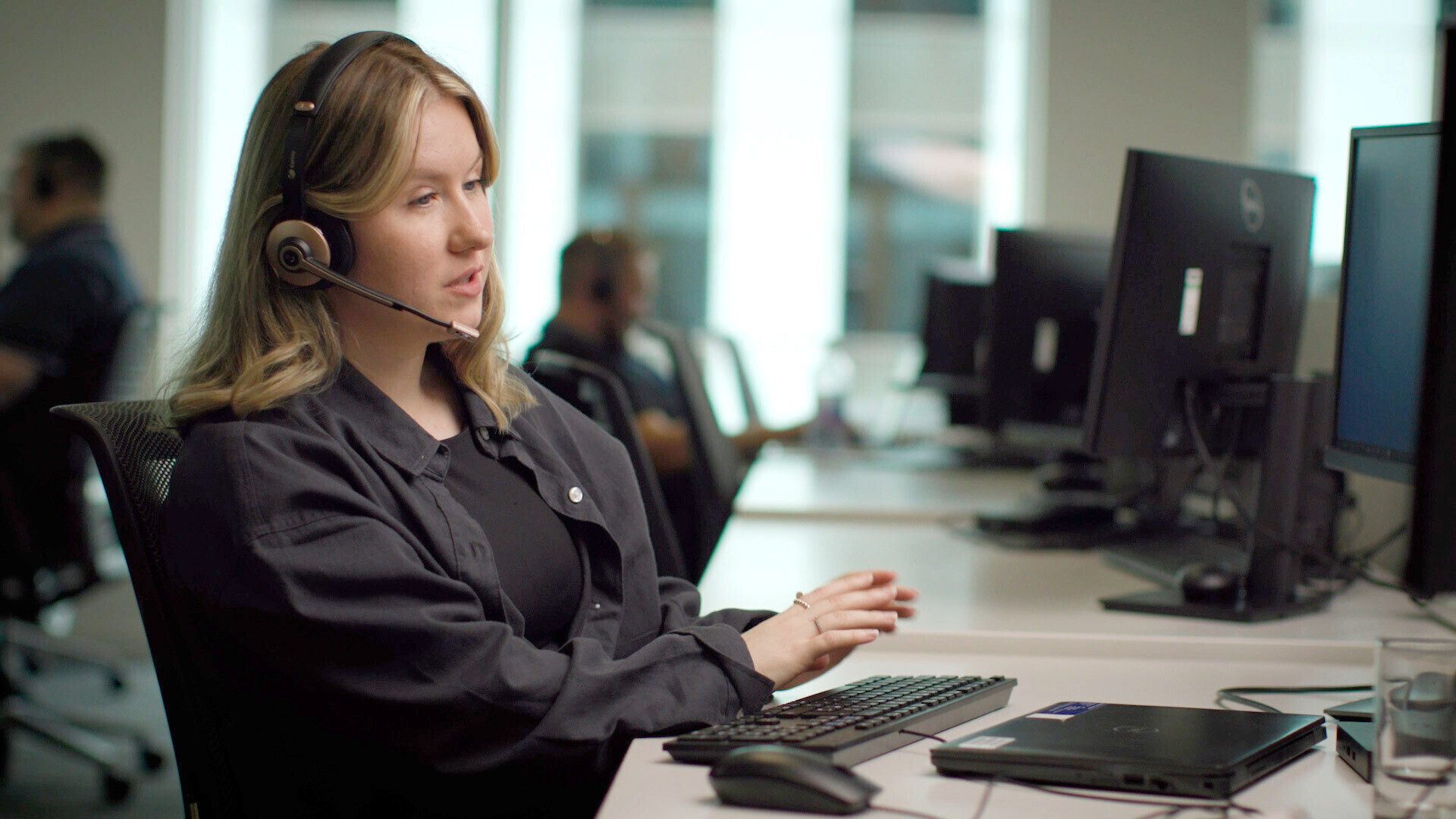Executive coaches share how promotions really happen - and what's needed to tackle the gender gap
播客文字稿
Lori Marcus, Band Of Sisters Organizations have this kind of central casting of what does a CEO look like.
Linda Lacina, Meet The Leader Welcome to Meet the Leader, a podcast with top leaders share how they're tackling the world's toughest challenges.
Today, we talk to two executive coaches about the gender gap at work and the practical steps everyone in the workplace can take to bridge it -- from bosses, to colleagues, to a new generation of women leaders.
Subscribe to Meet the Leader on Apple, Spotify and wherever you get your favourite podcasts. And don't forget to rate and review us.
I'm Linda Lacina from the World Economic Forum. And this is Meet the Leader.
Lori Marcus, Band Of Sisters I think historically, women haven't also had the like, "Hey, let me put you pull you aside and tell you how things really work here and what you really need to have in terms of experience to get to those big jobs."
Linda Lacina, Meet The Leader Our annual Global Gender Gap report was released this summer, and it always includes some sobering statistics, like the fact that it will take more than 130 years to close, or that while the 146 countries surveyed are making some progress, none have fully closed it.
And while LinkedIn data we looked at shows, women account for 41% of the workforce and only a third have top titles there, whether it's in the C-suite or in roles like director or vice president, closing the gender gap globally will take rethinking how we make opportunity more available and in the workplace. It will take a better practical understanding about how promotions actually happen.
For this week's Meet the Leader, I talked to Lori Marcus and Mitzi Short. They are members of the Band of Sisters, a group of six former executives turned authors and speakers on women's leadership. And they talk about how potential is applied differently across the workplace.
They have a new book out called You Should Smile More and talked to me about the themes from that book, and the block and tackle of promotions: who should be in the room when they're discussed. How the way we describe people can lock them out of jobs.
And they talked about the practical and tactical ways bosses and colleagues can better set women on their teams up for better roles, and how a new generation of women leaders can build their careers and position themselves for top jobs.
We'll get into all of that. But first, we'll get started with more on the Band of Sisters.
Lori Marcus, Band Of Sisters Maybe I'll start and then Mitzi, you can fill in where I left out. So, you know, kind of our quick origin story. We all work together, there are six of us. We all work together at PepsiCo over a span of about 20 years or so.
And then back in 2019, a subset of the group was at a dinner with Indra Nooyi at a very small dinner about five of us. Indra had just retired as the CEO and chair of the board of PepsiCo. And we're at this small dinner and somehow we got on the topic. Two things: One is all the little things that used to drive us all kind of crazy. Things that we felt throughout the years that kind of got in the way of us each being able to bring our full selves to work. Now I know enough to call them micro moments or microaggressions. They're like little, tiny acts of gender bias that we all had experienced but we had never really talked about with each other.
You know, you talk about things that drive you crazy when you have to come in over the weekend to rewrite this strat plan or whatever. But we never talked about these things that were so seemingly small. And yet all of us had experienced them. At the same time, at that dinner, we talked about how I don't even remember how it came up. I was one of the co-founders of the first ever Women's Resource Network at Pepsi, and this was in 1993, I think, before I had children. And I think in hindsight we thought, "okay, well, we'll fix these things. We'll make it, you know, sort of equal for women to participate in the workplace. And then someday in the future, when I have children, we won't have to talk about this. Like we'll fix it for them."
So here, this was 2019. My second of two children was about to graduate from college, and I think I had this moment where I realized, "oh gosh, number two is about to go into the working world and we haven't solved it. We haven't solved it." It was almost 30 years ago that we started this first women's resource network.
And so that was a big aha for me. Anyway, longer story. We started talking about it, talking about it, talking about it. And I think what we finally realized was we have power. We have power. Some of us are still sitting in executive seats. We're in corporate boards, we're coaching. We have a power, we have a voice. In some ways, maybe even more than we were when we were at one company with one job and one organization. And we have the power to use our voices to actually try and do something to dismantle gender bias in the workplace.
So that was the origin story back in 2019 of how we all got together and several 2 to 3 years of a pandemic and working from home later, it turned into a book that we launched last fall, and we've been out on the speaking circuit now talking to companies really all over. Of all sizes of all industries, men, women, allies of all genders, leaders trying to help them understand what are the factors that are that can impact gender bias, and then what are things that you can say and do to help eliminate gender bias.
Linda Lacina, Meet The Leader And Mitzi, tell us a little bit about what else you see as the potential for Band of Sisters to make change.
Mitzi Short, Band of Sisters When I think about the work that we can do as Band of Sisters is reflecting on the journey that we've had and the experience to say, you know, it could be better if workplaces were more diverse, if workplaces had less gender bias. So, what can we do to help support the acceleration of workplace inclusivity? Right. And so that's our role really, to go into organizations and corporations and continue the conversation or start the conversation with the intent of hoping that the discussion will spur action so that 20 years from now, 30 years from now, we're not having the same conversations. Things are progressing and in sustainable ways.
Linda Lacina, Meet The Leader I want to talk a little bit to start us off about the Global Gender Gap report, and that is a report that the World Economic Forum does every year, and it looks at global gender parity and exactly how far away we are from reaching it, both on a global and also on sort of a country-by-country basis.
The 130-year gap, 30-plus-year gap is what always gets the headlines. But in your guys’ mindset, what stuck out to you, what was interesting about this year's findings or what you think people can kind of bring into their own life? What's useful to you?
Lori Marcus, Band Of Sisters Oh, this is Lori. I'll jump in. So, I think two things. One is I would say -- and I spend a lot of my time both in the boardroom on my corporate boards and then coaching senior executives who want to join their first corporate board. And they spend a lot doing inner board enrichment and training and governance training and all of that being trained, I should say -- And what I find interesting is in general and this is going to get to the World Economic Forum's report, is that there's a real gap between what I would say, the rhetoric and the reality.
Understand progress is fragile
So, the rhetoric that I also often hear out there is, "oh gosh, a white man can't get on a corporate board. There's no way a white man can get on a board. Only black women are getting on boards." And I laugh a little bit. And I'm from New Jersey. So sometimes the snark comes out, which is, yeah, you know, sometimes say sometimes I just think, "yeah, it's great to be a black woman in this country. Black women get everything in this country. Black women have. It's so easy in our country." I mean, it's so it's kind of maddening to me a little bit. And everybody does it which is sort of the difference between the rhetoric and what the facts say.
For the past eight years, the proportion of women hired into leadership positions has been steadily increasing by about 1% per year globally.
”So, what I loved about the gender gap report is it bathes in facts. It doesn't bathe in rhetoric or fiction or story is just facts. And I think one of the things that stuck out for me was the statistic about that there was a decline in women hired into leadership. And it was, I think, a reversal of an eight-year positive trend. And so, I guess for me, if I were to summarize my thoughts on that, what it makes me feel like is sometimes the gains that we make as women, both in the C-suite and in, boards, it's so fragile, it's so fragile. It's not kind of permanent. It's not how we just do things yet. It's not just yet. That's an 'is' statement. Women are 51% of the population, so they're 51% of the executives or 51% of the corporate boards. Like we're not there yet. But even when we make progress, I think what it what always occurs to me is it's so fragile. So that was a, I guess, an observation that that I have.
Focus on flooding the pipeline
Linda Lacina, Meet The Leader What do you think? Is there anything else that sticks out to you about what's needed to bridge the gender gap that might not get talked about enough?
Mitzi Short, Band of Sisters Well, I think we still have to keep focused on flooding the pipeline. So how do we continue to get women in the workforce? How do we continue to get those that are in the workforce moving up through the leadership ranks? And so, what are the feeder roles that will help prepare women for those? What are the. No expertise that women have to have been the leadership experiences that women need to have to move to the toward the C-suite roles. What are the most critical experiences are critical assignments. And then importantly, how do we ensure that women are getting the sponsorship needed? Right. And so, are we getting the right assignments? Are we getting the right roles? Those are very important. Or do we have PNL (Profit and Loss) responsibility?
Make sure your manager can truly represent you
Linda Lacina, Meet The Leader It's fall. So many of these conversations are being had for the next year. What is getting overlooked when it comes to getting women into promotions or into better leadership positions?
Mitzi Short, Band of Sisters Well, there's a couple of things I think is really important in those conversations to have women in leadership roles, parts of those conversations, asking where are the women? Are we moving them through the ranks? Why are we just discussing men? Right. So that's number one.
Two, for the individual leaders, I think it's really important that your manager knows your you're full realm, your background, right? So many times, you get hired into companies or we move to new teams and they just know our last assignment. They don't know the 3 or 4 assignments that you had before. They don't know the number of teams, the size of teams, the complexity of teams they don't know, may not know that you have PNL experience or not. So, making sure your leader knows as much about you as possible so they can fully represent you in the room from a background perspective.
And then secondly, let your leader know what you want. Like what are your career aspirations? It's no time to be silent or shy. Just have those conversations. This is what I like to do, ideally, and this is what I think I need to do to grow in that role so that I can do that. Make sure there's alignment. And if there is not, have the conversation,. "Well, what's stopping you from supporting me for these types of roles? Ask your manager: "what are you going to say when you get in the room to represent me in the team," Right? So those are the two things. Make sure you got representation of women in the people planning sessions. And two, if it's you. make sure your leader knows your complete background and there's alignment on what your career aspirations are.
It used to be people would say, "Well, it's not what you know, it's who you know." I say the one up on that is, "It's not just who you know, but who knows you?"
”And I think the other key part of that is how do you get sponsorship? How do people know the quality of your work? And so, the first goal is to ask, well, who needs to know? And so, I think of that in terms of for the roles that you want to do next, do those leaders that are making the decisions for you to be on their team or not know you? So, it used to be people would say, "well, that's not what you know. And so, you know, I say the one up on that is it's not just who you know, but who knows you?" Who's going to stand up and say, Wow, Linda would be great because she's got PNL experience. I worked with her on this project. I saw her do this. She's a perfect person. Because what happens if you're in those meetings and somebody if you're if your name comes up in a discussion and someone in that room says, "Well, I really don't know her." Well, that means you're going to have a year of people getting to know you and you'll come up again the next year at the conversation.
Lori Marcus, Band Of Sisters Yeah. And I'd love to add to that, just amplifying something that Mitzi had said earlier about flooding the pipeline. It's not just in any roles, but really want to sort of emphasize what Mitzi said about what roles are the roles that lead to the most senior levels in the company. And if it is PNL experience, then like what? What are those roles specifically? Right? So maybe another brand management or marketing innovation role, Like maybe that's not helping you get to -- maybe it'll help you become a chief marketing officer, but it might not help you become the CEO.
And again, we talk about this later. Not everybody has to want to be the CEO or be the CEO. But I think what people need to be clear about is if you do want to be the CEO or something like a CEO, division presidency or whatever, what are the roles that lead to that? And to get really, I guess, explicit about that and have those conversations, because I think often people can say, "Well, I'm rising through the organization, I'm getting more experience, I'm getting more money, I'm getting bigger titles, I'm running bigger organizations." Which is excellent. And that doesn't necessarily mean that you are putting yourself in a pool of people that are being developed to be a CEO or ultimately a sort of a massive PNL leader in the organization.
Linda Lacina, Meet The Leader And Lori, why is it that people might find themselves 20 years down the line without that experience, not realizing, "hey, was I managing? Did I have an say on the the budget. Was I dealing with the money side or was I really more on this other this other realm? Why is there not that connection? How does it happen that people are in these positions?
Lori Marcus, Band Of Sisters Yeah. So, it's funny, one of the things and we're out speaking, Katie always says that a piece of advice. Katie is one of our sisters, Coauthors. always says that, you know, one piece of advice she always gave her teams was follow the money. And she doesn't mean just try and make more money, but it's really understanding how the company makes money. And it is amazing how many people you talk to in organizations that, you know, have really meaningful jobs, but they kind of allow themselves to sort of be in their little silo and really maybe be an expert at what they do, but not really understand where it fits in to the company's PNL and how the company makes money.
What I would say sort of putting the burden back on companies and companies is just a series of people. There's no such thing as a company. I used to feel this way when I worked in corporate America, and now I feel this way times 100 as a board director and an executive coach, which is people are not good at having sort of real conversations. They're not good at having, as a general rule. Even companies that have systems and processes for setting accountabilities, doing mid-year calibrations, having end of year review. As a general rule, people use the lazy language, which I hope you'll invite us to talk about in a couple of minutes, but lazy in terms of having discussions that are a little bit in depth, a little bit, you know, a little bit harder to have, a little bit more provocative. And so, I think sometimes for, you know, people that are up and coming in an organizations, they've actually not had those conversations happen with them.
And then you think about for women and underrepresented groups is they don't have all that sort of natural kind of someone takes them under their wing. They're playing basketball in the morning. Someone's talking about they don't have those ways necessarily of understanding how things really work in an organization.
And so even though the statistic says that women are over mentored and under sponsored, which I think is very much true, I think historically women haven't also had the like, hey, let me put you pull you aside and tell you how things really work here and what you really need to have in terms of experience to get to those big jobs. Quote, they quote unquote, may say it's this, but you really these are really the jobs that matter.
So, I think it's a combination of a lot of things. I think it's the general thing about people don't always like to have these kinds of detailed and somewhat complicated conversations. And then I think women in particular are sort of underserved in terms of the conversations about how things really work in an organization.
Linda Lacina, Meet The Leader So let's talk a little bit more about this. So, what are some actionable ways that people can either draw women into these conversations or also sort of make sure that when these promotions are being bandied about, that more women are being considered for them, that they're in part of those informal talks.
Make time for development conversations
Mitzi Short, Band of Sisters So I think I think for leaders in particular, it's important to have the development conversations and make it part of the annual process or the way that leaders lead. So, we're going to have individual development plan discussions. They're going to be separate. They're not going to be at the end of a business meeting where we only have 5 or 10 minutes. And we're really going to talk about what we see as strengths and opportunities. What does a person want to have their career journey look like? And we're going to create it in an action plan. We're going to have candid conversations so that there's alignment on strengths and opportunities. There's a game plan for what experiences and exposure people need to have, and then a commitment to work the plan together and to follow up.
Lori Marcus, Band Of Sisters This is Lori. We talk a lot in the book, but mostly when we're out with companies, talk a lot about this notion of lazy language. And so, I think sometimes what happens is we have the conversations. They're at the time they're supposed to have them, but then you'll be in a people planning or HR. People planning discussion. Corporations call them different things. Even small companies will call them different things. And if you listen to the language, if you sort of took yourself out for a minute and you really scrutinize the conversation, you will hear things like, John's a great guy. Yeah, he's terrific. He's a terrific he's a great guy. And then you'll hear for women, people talking more about sort of, well, what were her results? What did she accomplish? And it sort of points to the notion that men tend to big generalization, but men tend to get evaluated based on potential. And women tend to get evaluated based on what did they actually achieve. So, I love the wording around, kind of scrutinize the conversations and just make sure we're having the same conversation for people of all genders. So, are we talking about if it's a sales leadership meeting, are we talking about the sales competency model or the finance competency model? And we're not talking about attributes in one case and results in another.
Remember: The best talent isn't always the most well known
Linda Lacina, Meet The Leader Sure. And men in particular, is there a special role that they can play or a special question they should ask themselves that maybe wouldn't be obvious? What should they do.
Mitzi Short, Band of Sisters Especially in the context of sponsorship men and women, but particularly men, because that tends to be where the power is at time, right? Has an opportunity and an obligation to their organization to find the best talent, even though they might not be the most popular, most well-known. So, for men to say, what does my sponsorship tree look like? The leaders that I've grown and developed and nurtured and got in the right roles and got them in the right critical assignments. Am I doing the same for women? Am I doing the same for people of color? Right. I have an opportunity to do that and an obligation.
And I am I creating systems where my whole organization is doing that. So, I'm expecting my leaders to do the same, to look at their sponsorship and their development of women and people of color as well.
Linda Lacina, Meet The Leader Plenty of promotions happen because there's an opening. Somebody leaves and has to get filled right away. Then often that is done from the team that's in place. And if it's a top leadership role, it's often not done with too much long-term planning as far as the company is concerned, or even a real deep knowledge of the rest of the bench. How should people think about this and how can they prepare for this sort of situation?
Mitzi Short, Band of Sisters You have to be intentional about it and you have to be committed to creating a succession plan, which is key to really having the right talent to run the business appropriately in any organization. Just got to be mindful and on top of that. And that's why I think it's really critical that female leaders have conversations with their managers so that they know what they want to do with their career or what's in the realm of possibility. So, when an opening comes up, it's not like, well, I don't know if she would want that or not. Oh, I know, because we've had the conversation and it looks like this or maybe this or I don't know exactly what it looks like, but these are her talents and skills and gaps. And here's how we have a developmental assignment to fill those gaps. It's with intention.
Focus on the change that's possible - not just the problems that exist
Lori Marcus, Band Of Sisters Yeah. I think the other thing is there's I don't know what you would call it if it's kind of like an urban myth or. So, I'll give an example from, I don't know, almost 30 years ago. So, there was a great leader in the organization back in the day when Mitzi and I both worked at PepsiCo. Wonderful woman. May she rest in peace. Brenda Barnes And she was either the president of Pepsi North America or like a co-CEO, but like a very big job. And she was very committed to increasing diversity in the organization. And I'll focus on women for a minute.
And in the business that we were in at the time, the distributors, you know, who distributed cases of Pepsi products up and down the street, that's a very physical business. It is largely dominated by man. I mean, you were selling in Pepsi, where I haven't used in wrestling in cases of Pepsi products, you know, unloading coolers wherever. It's a very physical job. And for the most part, it's very dominated by men.
And so, there was kind of this urban legend that then will people then would grow up in the business, start as rude salesmen or driver salesmen, and then you kind of advance in the organization? Well, lo and behold, you get to territory managers, district managers, region managers, and you have very few women.
And so, Brenda just said what any leader can say, it doesn't have to be a woman is to just say, well, just because the driver salesmen are men doesn't mean that we couldn't have women as territory sales managers, as key account managers. And so, she just put a directive in place and she said every territory and I don't remember how many there are. Maybe there's 200 territories across the country. I can't remember. This was probably early '90s. And she just said every territory needs to have a woman in a leadership position in the next whatever it was. Two years, three years. I don't remember the numbers, but it was such a great example to me of, first of all, like the urban myth about like, "Oh, you can't have women in management because they didn't drive the trucks to get there."
She just was like, "That's actually not true." And we get somewhere in the territory sales manager. Then they come a region district manager, region manager, area vice president, region, vice president, etc. whatever their roles are as you get up the organization. So, she just busted the myth and said like, that's not true and I'm holding everybody accountable. I'm putting metrics in place that you have to get to that number. She didn't say you have to get there in the next month. And she just made it so. And then people stopped talking about the urban myth and they put their efforts on, okay, how are we going to get women in these roles? And it was like a seismic shift for the company.
What if all leaders of every gender took the attitude: let me not list all the reasons that this problem exists, but let me just say, what would it take to make it different? And then realize they have so much power, to make change.
”So, I think if I were kind of taking that up three notches, what I would say if all leaders of every gender took the attitude that says, let me not list all the reasons that this problem exists, but let me just say, what would it take to make it different? What would it take to make the change? And then realize they have so much power, you know, to make change.
We had a conversation the other night with a friend who's a partner in a law firm, and it was he’s a risk. He's a chief risk officer as well. And we were talking about things like, does their firm pay for women to freeze the eggs or not? And the first thing that comes to somebody’s mind is, well, we can't do that. That would cost us millions of dollars a year. And I had just come from a board meeting where one of the companies I'm affiliated with, there were some it wasn't that, but it was a similar thing that they thought would be millions of dollars. And then when they actually went through the work, you know, for a multibillion-dollar company, it was like, "oh, that would be $100,000 cost a year." It just wasn't it wasn't material.
But they did the work and they took the attitude of what would it take to make it so. And so, I was listening to a podcast last week and they were having a similar conversation. It was about freezing eggs or maternity leave or whatever. And they just said, let's for a minute say we're going to get to the right answer. And what they realized was all these urban legends exist. Well, if we did that, it would cost us millions of dollars. Everyone would want to freeze their eggs. And you get into these big sort of “Everyone would want to. Everyone would be traveling across states to do this. Everyone would want to.”
And when you it gets back to your question at the beginning of this of this call about the Gender Gap Report that you did. I love that you started with facts. You don't start with rhetoric. You start with facts. And I think if I were summarizing my thoughts, I would say leaders have the opportunity to sort of start with the facts. What would it actually cost? What would it actually take? And then realize that they have the power to enact change. And instead of staring at the problem, they can actually put things in place to drive change.
Ask yourself 'Why not?"
Linda Lacina, Meet The Leader You know, it's interesting. So, I talked to a very fortunate I get to talk to all kinds of interesting people, very accomplished people. And an observation I've had only from the ladies, CEOs, top level folk, is in some cases they weren't seeing themselves as CEO. The opportunity came about and they say to themselves, you know, "oh, gosh, I, I wouldn't have thought about it. But so and so talk to me about it. And then I saw it." Or in some cases, they say, "hey, you know what, I thought I could make a bigger impact elsewhere in the organization. I like my job. I know it really well. I feel like I'm uniquely positioned to do something important right here, not over there."
Can we talk a little bit about people thinking in that way and not thinking that their skills are relevant for top leadership or like, "Oh, that's not for me. I'm doing this other thing over here." We talk a little bit about that and like maybe other ways they can think about it.
Lori Marcus, Band Of Sisters I'm happy to jump in while I'm on my let's quote, you know, Brenda Barnes from the early 90s. One of the things that Brenda used to say and it was just so sort of obvious when she said it, but I gave her a lot of credit for saying it. So, let's say she was the CEO at the time and she would say, not everybody has to be the CEO of PepsiCo. She's like, it's a job. You know, I at the time she said, I've lived apart from my husband. I'll get the years wrong. You know, 12 out of the 15 years we've been married, we've lived in different cities because we have we both have like huge jobs. She's like, I get to the office at 6 a.m.. The days that I'm here. I'm on the road with our distributors and our customers three days a week. And if you want to be the president of Pepsi North America, that's pretty much what it takes to be the president of Pepsi North America.
But then she always paused and she said, "But not everybody has to be the president of Pepsi, North America. We have hundreds of thousands of employees and only one president." So, it doesn't have to be for everyone. So, I guess I always start by saying not everyone has to be the CEO or want to be the CEO, and that's for people of all genders. Right? Being the CEO of a company, I've worked for several in public companies, it is a grueling, grueling job, mentally, physically, emotionally, everything associated with that. So not everybody has to want that level of stress and commitment in their life and being sort of on literally 24 seven. So that's my caveat.
That said, I do think that what happens is we are socialized, especially as women. We have this kind of and I think it's not just that women have it. I think organizations have this kind of central casting of what does a CEO look like. And if you think about kind of the you know, if anyone remembers Broadcast News a, you know, a movie from probably 25, 30 years ago, that sort of like, what does an anchorman look like? You have the same thing about CEOs. What do they look like? And I know last year we all celebrated that the statistic that there are more CEOs named John in the Fortune 500 than there are women CEOs. We celebrated last year that that statistic was no longer true. Can you imagine? That's a celebration.
But my point in that is that is the kind of central casting that people have in their head, whether it's conscious or unconscious, they have an image of what a CEO looks like and how they act, their pedigree. They probably grew up playing team sports. I mean, all of that. They certainly don't cry when they get angry or emotional in the workplace. And so, I think there's a little bit of companies have a role in terms of developing women, getting them in the right feet or roles that can lead to be a C-suite executive and especially a CEO. And then I think for women and certainly leaders can do this with women, is to say, take a blank sheet of paper. Let's talk about what does a CEO do, What's involved in being a CEO? What are the skills that you have to have to be CEO?
I had a conversation yesterday with a friend who's a CFO, and he was talking about that like he loves the internal part of being a CFO, but he doesn't love dealing with investors, dealing with Wall Street like he just doesn't love that work. And so, it. 30 something years old. He's having a conversation with himself about, you know, in my next ten years, do I really want to be a public company CFO? Because to be a public company CFO, you have to spend a good deal of your time dealing with the street, dealing with investors. But the point is, he has the piece of paper in front of him that says, What does a public company CFO do? What are the skills required? How do they spend their time? And then he can make a decision.
So, I always encourage people to take a clean sheet of paper and say, what does a CEO do? And if you don't know that, those are great conversations to have with other people, as you try and figure out skills you possess, skills that you kind of need to put in your basket of skills and then other factors as well. But start fresh and try and take the kind of central casting that you have that's been imprinted on your brain. Try and push it aside long enough to have a kind of a clean sheet conversation.
Mitzi Short, Band of Sisters I think this is a great question, particularly in the context of the decline in women in the CEO roles. And I see this in the CEO roles and I see it also in senior level roles. And so, for me, the question is, "Why not? Why not you?"
And I think a lot of that is to your point, Lori. Some people some women don't see themselves in that role for whatever reason. But I would ask them for the reasons that they have. Is it true? Is it true? If you don't think you're good enough or somebody told you didn't have the right. Is it true Katie Byron wrote a great book on this and she talks about this, But sadly, I think most people and seen a lot of people on senior levels in the number two or in their consideration for CEO. A lot of them can definitely do the work. In fact, some of them probably are doing the work without the title, without the money, without the benefit. So why not you? And I think instead of thinking about. Well, it won't work. Why will it work? Right. And we see. We see things as they are. But think of if you were the CEO, then you could arrange things the way you want. You could have worked the way you could. All these things you talk about change, you have the opportunity to change. So, I think, you know, we just I would like to help women create different stories for themselves. Stories that say, yes, I want to. I can. I will. It's going to be different. It's going to be better. And yes, I'm up for it.
Consider how you can create options for yourself
Linda Lacina, Meet The Leader I love that. I love that. I have a question for both of you. With all of the directions that you've both taken in your careers with the element of coaching, the element of helping others, you know, you have found other ways to before all this to manage your careers differently. What is the biggest change that you made in your own lives and your own careers? That was sort of a, I guess, a game changer, you know, the biggest change that you made your career and what did it teach you?
Mitzi Short, Band of Sisters So for me, just in terms of trajectory, trajectory, I started my career as how can I create options for myself at any fork in the road, multiple options in terms of what I wanted to do. And the challenge for me was recognizing that operations and piano were really important. And so having a sales and marketing career was important. But when I got the operational management roles, that was really different. Right. That was a game changer for me. So, making that shift I think was really important. I also think just from a kind of process approach perspective, I learned early on that figuring out understanding how things work back to, you know, the way you were. Katie always says, I follow the money, but understanding how things work and who work them was critical, was critical. And so, I try to do at each level and then just broaden brand perspective and experience and forget from having to do the work and the hard assignments.
And for me as an African-American female, I felt like I was under the microscope. You're the only one in this setting or that setting, and you know you can't mess up. So, you have to work harder. And I think that just doing the hard work gave me the confidence that, you know, if I can do this in this environment, I can do anything.
Lori Marcus, Band Of Sisters And I think for me, we talk a lot about and I've been very privileged to work for amazing companies that had great people development and really, really focused on the process around that input, put a lot of time and effort into it. We talked a lot about critical experiences and getting critical experiences. But I think if I'm honest, I never felt like there was really a safety net. Like is the return ticket there for you if you go take an international assignment, and it doesn't work out incredibly well. Do you have the sponsorship back home to say, okay, you know what, she learned something on that. She's still on the track. I think I stayed close and I did things that allowed me incremental growth.
And one of the big changes for me was -- Mitzi I have, I think, a common belief, which is there's this little hidden secret and it's the joy of living slightly below your means. And so, it gives you a lot of flexibility if you're not always buying the next big house and the second house and the third house and the big, you know, fancy this and fancy that gives you a lot of choices. By the time you get to your 50s, it gives you a lot of choices in terms of not what do you need to do, but what do you want to do? And I think for me, when I left PepsiCo, I just said, you know what? We lived in the same house since I was the senior manager, you know, decades before. And so, we just had some flexibility to say, I'm going to try something different. So, I went and I became the chief marketing officer of a retailer, a specialty retailer. There were 600 people in our headquarters. 599 of them had spent their entire career in retail. I was the only person from consumer products Like that was kind of a big swing. And I just thought, you know what? If I if it ends up working out well, I'm going to learn a ton. I'm going to learn, you know, direct to consumer and e-commerce. And if it doesn't, then I'll leave and I'll go do something else.
I went to you know, Peloton at the time was under $200 million in revenue, private company. I'd only worked for big public companies. And then the same thing with my boards. My attitude was, you know what, I'm going to take? Like, I'm going to take a big swing and what's the worst thing that'll happen? So, I guess if I were headlining my thoughts on that, I would say having the confidence a little bit later in my life, probably not until I was in my 50s to say I can take bigger risks. I don't have to take moves that just have incrementality to them and that have a very large safety net.
Linda Lacina, Meet The Leader What is a piece of advice that you have maybe always been grateful for, something that you're like, Gosh, I'm so glad someone said that. That stuck with me and it made this important impact for me.
Lori Marcus, Band Of Sisters There's a there's a chapter in our book and it's called Be Like Bill. And I'll give you this as background because I had my own sort of be like Bill moment. And the idea is basically that, you know, this the research suggests that men tend to apply for jobs if they have 50 or 60% of the qualifications, they'll apply for them. And women tend to only apply for jobs or promotions if they feel like they have 90 plus percent of the skills. And the reality of it is two things. Women are not being paranoid or crazy about this. The research does suggest, as we talked about earlier, that men do tend to get evaluated based on potential, and women do tend to get evaluated based on their actual results. So, women aren't being paranoid when they don't apply.
But on the other hand, there's something that men do that is really healthy, which is they look at their job description or their qualifications for promotion and they say, "Oh, I've got about 50 or 60% of them. The other 40 to 50% will be on the job learning and growth for me." that's a really healthy attitude. And so, I feel like I was very much suffering from the sort of the women's side of "Be like Bill" I would go into reviews very focused on all of the things that I was going to do next year to do an even better job. You know, I would do all those kinds of, you know, classic things that that people talk about, that women do. I would always focus on my development needs versus my accomplishments and potential and things like that. So where does this where did this come really to like a moment that kind of hit me between the eyes After I left Keurig back in 2015, I really decided that I wanted to start this portfolio career. I wanted to join corporate boards, I wanted to do executive coaching and I wanted to do keynote speaking. [Editor's note: I had no idea how to do any of those three, let alone all three of them, but I just figured I would do the Lori thing. I would have a million cups of coffee with people, I'd have a million conversations, and at some point I would figure it out.]
One of the things that I know and I coach people on often is state your intentions to the universe. If you're looking to join a board, you have to tell everybody, you know, everyone that's on boards, every lawyer, accountant, banker. You have to let people know they're not waking up in the morning saying, I bet Lori wants to join a board, right? You have to let your intentions be known. So long story. I'm on a call. I've been on a not-for-profit board for a long time. It's in the cancer research space and we were doing CEO succession. And so, I was on a constant series of calls. I was the vice chair and there was a guy with the name of Mike who was the chair. We're doing that thing you do when you're waiting for the third person to join in on the call and you're making small talk that at any time you could stop when the third person joins the call. Mike does that. Are you still working for Craig? No. Did I tell you I left I came back to Connecticut. I really want to do this portfolio career step up, including board service. Oh, Mike, are you still working at X, Y, Z Company now? It turns out we sold the company and I started a private equity firm, and he said, Oh, that's funny that you want to do board work. This is getting to your answer. He said, “We just our company just bought a company in Ohio. It's in the DNA testing space and we're looking to add an independent board director, someone who has brand and retail experience.”
[Note to the listeners: that's my background.] And he said, “And we also want someone who understands health care.”
Okay, I pause. Here's the moment I like a dumb dumb said, “Oh, Mike, I would love to be considered for that role. I obviously have the branding, the retail experience, but I don't have health care experience.” And this story -- I get a little choked up when I say it because I'm so grateful to Mike. And he did what all leaders can do and he kind of had to he had my be like Bill moment. And he said, “Mrs. Marcus, might I remind you that you were the vice chair of the board of the Multiple Myeloma Research Foundation? You have probably forgotten more about health care than most people will ever know.”
And I just really want to pause on that for a minute because you've asked the question about what can men do? What can allies do? What can leaders of any gender do. Mike did the right thing. He pulled me out of that moment. He had the moment with me that Missy talked about a little while ago, which is why not? And he sort of turned my vision around in my very simple head because I didn't get paid to serve on that non-for-profit board. I just didn't include it as part of my experience. And he did the turnaround thing and he gave me my sort of be like Bill moment. And I was like, You know what? You are right. I am never going to make that dumb, dumb move again. And so, I ended up he introduced me to his partners. I ended up serving on that board for five years. It was a perfect first corporate board for me. We ultimately sold the company like it was just a ten out of ten all around and it would not have happened had Mike not taught me to not diminish myself, but to sometimes be like Bill And think about your experience in a very expansive and not undersell yourself. So, I'm very grateful for that moment and I try and do that with other people as well, which is the why not conversation versus the why you might or might not be qualified.
Make sure you learn how things work and who works them.
”Linda Lacina, Meet The Leader And what about yourself, Mitzi? Is there a piece of advice that you've maybe always been grateful for?
Mitzi Short, Band of Sisters So there's two things that that I've learned. One from my dad in particular related to a career. He said, you know, make sure you learn how things work and who works them, including how the money flows, right? So that was that was really key. And then later in my career, I learned that, you know, you really have to ask for what you want. You know, early on, you know, you put your head down and you do the work and you get tapped on the shoulder and your leader says, Hey, we got this great opportunity for you. It's a promotion. Yeah, I'll take 2 or 3 of those. But then you're like, okay, well, what are the options? And so, for me, it's all about creating options. And then once you see what the options are, it's asking for what you want. No time to be shy if you want this type of assignment. But if you want to do this type of work, let people know what your preferences are. So, asking for you want for what you want is really key.
Study how work gets done
Linda Lacina, Meet The Leader We Talked about small talk. You can kind of weave this in what are other things you coach people to do so that they position themselves for, you know, other opportunities?
Lori Marcus, Band Of Sisters Don't just pay attention, especially as leaders to content. Pay attention to the how work gets done. So, when you're leading a meeting, especially if you're the most senior person, get to the meeting early, watch the dynamics, watch the pre-meeting chit chat Is everybody included? Are six of eight people talking about the Eagles game from the day before and two people are sitting there kind of twiddling their thumbs trying to get. Into the conversation. Look at meeting dynamics. Look at our people. I'll say in our case, are women getting sort of talked over what we call great idea, Greg, which is they'll say something, people step over it, step over it ten minutes later. So, you know, man says the same thing. And everyone's like, great idea, Greg.
Pay attention to dynamics. Pay attention to who's taking the notes, who gets, you know, volun-told for certain committees, who's doing the office housework. Who gets asked to bring in the cupcakes for, you know, administrative assistant days? Who gets asked to plan the baby showers? Right. Pay attention to all that. How the work gets done. Often is leaders. It's very easy to get very sort of micro focused on the, you know, rate of returns of the coffee brewers or getting the deck pages ready for a customer top to top and all the what of the work. And they don't pay attention to the how the work gets done. And I think at every level, if you start to pay attention to the how in meetings and overall, you will be much more observant and able to help everybody, you know, kind of keep some of these microaggressions down and help everyone achieve their potential.
Find ways to promote and highlight great work that might not otherwise be seen
Linda Lacina, Meet The Leader Mitzi, tell us a little bit about micro-aggressions, but also micro boosts.
Mitzi Short, Band of Sisters So. A couple of things. One of the big things is how do you help highlight great work that people are doing that might not otherwise be seen. So, giving someone or a female on your team exposure, the opportunity to present to your boss or to your boss's boss or to the to the board. So, helping get exposure, helping someone get an assignment that they an international assignment or working on the biggest task force that the organization is working on, how can you give people exposure to exact assignments that are really going to help, you know, really want up their skills and abilities in ways that they would not have gotten that before. Simply, you know, being in a meeting where, you know, a female says something and no one. Remarks or comments. And then two minutes later, a male counterpart will say the exact same thing. Well, a big boost would be to say, Sam, that was a great way to build on Linda's idea. Right. Calling that out. That's that that would be helpful. Those are few things on both ends of the spectrum.
Linda Lacina, Meet The Leader We'll give the last question to Mitzi. Mitzi, is there anything else you'd like to cover?
Mitzi Short, Band of Sisters Microaggressions are still happening in the workplace and micro solutions are just as impactful. And really dealing with that. Right. So, it's not like there's a lot of things that we can do micro solution wise. This not going to take 20 to 30 years. We just got to start doing right. And so, I think if we can get everybody to actively be seeking out and looking for these microaggressions and coming up with the solutions one at a time, it'll be very helpful. And the other thing I think is really important is we've got to call we've got to build allyship.
How do we work together to dismantle the bias that exists?
”We're calling men in. So, this is what we seek to do in our book. It's really not about male bashing or anything like that. It's really how do we work together to dismantle the bias that exists. So, we're calling men in, we're calling women in, and we're really speaking to people from three perspectives, Right? If it's you if you're the leader and if you are the boss or witness.
Linda Lacina, Meet The Leader That was Lori Marcus and Mitzi Short. Thanks so much to them. And make sure to check out the excerpts from their recent book. You Should Smile More on our site. They're also pasted into the show notes.
Thanks so much to them and thanks so much to you for listening. A transcript of this episode and transcripts of my colleague's episodes of Radio Davos are available at Wef.ch/podcasts.
This episode of Meet the Leader was presented and produced by me with Taz Kelleher as editor and Gareth Nolan driving studio production. That's it for now. I'm Linda Lacina with the World Economic Forum. Have a great day.
Executive coaches Mitzi Short and Lori Marcus share a tactical approach to careers and promotions to help women get their work noticed while eliminating gender bias in the workplace. These coaches, two of the 6 members of Band of Sisters (a group of former executives turned authors and speakers), discuss the the block and tackle of promotions: what experiences you must have on your CV for C-Suite roles; what development conversations you should be having with your boss (or your direct reports); and if you’re a male leader, how you can be a better sponsor across your organization to help position women and people of color for leadership positions and opportunity.
话题:
领导力分享:
更多集:
每周 议程
每周为您呈现推动全球议程的紧要问题(英文)













